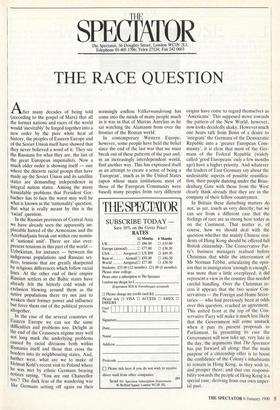SPECT THE AT OR
The Spectator, 56 Doughty Street, London WC1N 2LL Telephone 01-405 1706; Telex 27124; Fai 242 0603
THE RACE QUESTION
After many decades of being told (according to the gospel of Marx) that all the former nations and races of the world would 'inevitably' be forged together into a new order by the pure white heat of history, the peoples of Eastern Europe and of the Soviet Union itself have showed that they never believed a word of it. They see the Russians for what they are, the last of the great European imperialists. Now a much older order is showing itself — one where the discrete racial groups that have made up the Soviet Union and its satellite states are demanding independence in integral nation states. Among the many formidable problems that President Gor- bachev has to face the worst may well be what is known as the 'nationality' question. But what is really meant by this is the `racial' question.
In the Russian provinces of Central Asia we have already seen the apparently im- placable hatred of the Armenians and the Azerbaidjanis break out within one nomin- al 'national unit'. There are also ever- present tensions in this part of the world Uzbekistan, for instance — between the indigenous populations and Russian set- tlers; tensions that are greatly sharpened by religious differences which follow racial lines. At the other end of their empire Russian settlers in the Baltic states have already felt the bitterly cold winds of exclusion blowing around them as the native populations there try not just to weaken their former power and influence but force them out of the political process altogether.
In the case of the several countries of Eastern Europe we can see the same difficulties and problems too. Delight at the end of the Ceausescu regime may well not long mask the underlying problems caused by racial divisions both within Rumania itself and those that cross the borders into its neighbouring states. And, further west, what are we to make of Helmut Kohl's recent visit to Poland where he was met by ethnic Germans bearing notices saying, 'You are our Chancellor too'? The dark fear of the wandering war like Germans setting off again on their seemingly endless Volkerwanderung has come into the minds of many people much as it was in that of Marcus Aurelius as he sat watching the Alamanni from over the frontier of the Roman world.
In contemporary Western Europe, however, some people have held the belief since the end of the last war that we must break out of these patterns of the past and, in an increasingly interdependent world, find another way. This has expressed itself as an attempt to create a sense of being a `European', much as in the United States (upon whose main institutions most of those of the European Community were based) many peoples from very different origins have come to regard themselves as `Americans'. This supposed move towards the pattern of the New World, however, now looks decidedly shaky. However much one hears talk from Bonn of a desire to `integrate' the Germans of the Democratic Republic into a 'greater European Com- munity', it is clear that most of the Ger- mans of the Federal Republic (widely called 'good Europeans' only a few months ago) have a higher priority. And whatever the leaders of East Germany say about the undesirable aspects of possible reunifica- tion, their people dancing under the Bran- denburg Gate with those from the West clearly think already that they are in the company of their fellow countrymen.
In Britain these disturbing matters do not, as yet, touch us very directly; but we can see from a different case that the feelings of race are as strong here today as on the Continent. That matter is, of course, how we should deal with the question whether the mainly Chinese resi- dents of Hong Kong should be offered full British citizenship. The Conservative Par- ty's business managers realised before Christmas that while the intervention of Mr Norman Tebbit, articulating the opin- ion that in immigration 'enough is enough', was more than a little overplayed, it did represent a view in the country that needed careful handling. Over the Christmas re- cess it appears that the two senior Con- servatives — the Foreign and Home Secre- taries — who had previously been at odds over this question, reached an agreement. This united front at the top of the Con- servative Party will make it much less likely that the Government will come unstuck when it puts its present proposals to Parliament. In presenting its case the Government will now take up, very late in the day, the arguments that The Spectator has put forward all along: that the main purpose of a citizenship offer is to boost the confidence of the Colony's inhabitants to remain in Hong Kong, as they wish to, and prosper there; and that our responsi- bility towards the people of Hong Kong is a special case, deriving from our own imper- ial past.










































 Previous page
Previous page